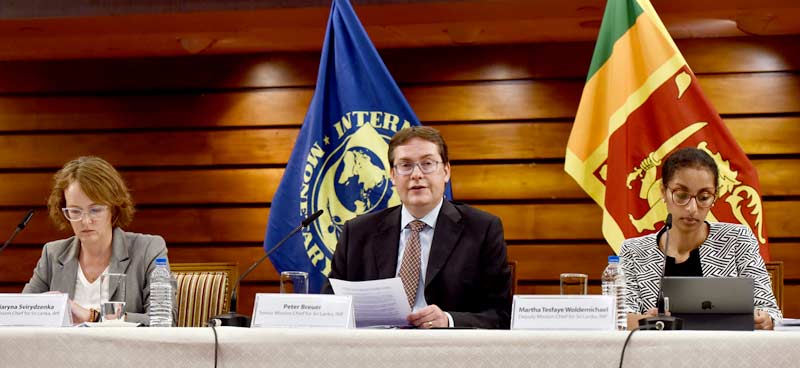IMF happy with AKD’s commitment; eyes 2025 Budget
Monday, 25 November 2024 03:17 – – 24

IMF’s Senior Mission Chief for Sri Lanka Peter Breuer (centre) with Deputy Mission Chief Katsiaryna Svirydzenka (left) and IMF’s new Resident Representative to Sri Lanka Martha Tesfaye Woldemichael at media briefing on Saturday – Pic By Upul Abayaskara
- Says new Government’s commitment has enhanced confidence and ensures policy continuity
- Stresses sustaining reform momentum critical to safeguarding hard-won gains via program and putting economy on path towards lasting recovery, and stable and inclusive growth
- Calls for continued revenue mobilisation efforts and spending restraint to prepare 2025 Budget in line with program parameters
- Suggests avoiding new tax exemptions will help reduce fiscal revenue leakages, corruption risks and build much needed fiscal buffers
- Urges for redoubling efforts to meet program’s minimum spending target on social spending and to improve targeting
- Critical next steps – complete commercial debt restructuring, finalise bilateral agreements with official creditors thereby restore debt sustainability.
- Says new Government’s mandate will reinvigorate governance reforms addressing corruption risks, rebuilding economic confidence, and making growth more robust and inclusive
The International Monetary Fund (IMF) on Saturday welcomed new President Anura Kumara Dissanayake’s and his Government’s commitment to continue with the on-going program and identified the 2025 Budget as a litmus test.
The IMF’s opinion follows its staff and the Sri Lankan authorities on Friday reaching agreement on economic policies to conclude the third review of the economic reform program supported by the IMF’s Extended Fund Facility (EFF).
Once the review is approved by IMF Management and completed by the IMF Executive Board, Sri Lanka will have access to about $ 333 million in financing bringing the total under the program to $ 1.3 billion.
“The new Government’s commitment to the program objectives has enhanced confidence and ensures policy continuity. Sustaining the reform momentum is critical to safeguarding the hard-won gains under the program thus far and putting the economy on a path towards durable recovery and stable and inclusive growth,” said IMF’s Senior Mission Chief for Sri Lanka Peter Breuer at a media briefing on Saturday along with Deputy Mission Chief Katsiaryna Svirydzenka and IMF’s new Resident Representative to Sri Lanka Martha Tesfaye Woldemichael.
Breuer said The IMF’s Executive Board will consider completion of the review based contingent on: (i) the implementation by the authorities of prior actions including the submission of a 2025 Budget consistent with program objectives; and (ii) the completion of financing assurances review, which will focus on confirming multilateral partners’ committed financing contributions and whether adequate progress has been made with the debt restructuring to give confidence that the restructuring will be concluded in a timely manner and in line with the program’s debt targets.
The IMF reiterated that Sri Lanka’s ambitious reform agenda supported by the EFF is delivering commendable outcomes. The economy expanded on average by 4% y-o-y in the four quarters ending in June 2024. High-frequency indicators point to continued expansion across all sectors. Average headline and core inflation remained contained at 0.8 and 3.8% during the third quarter. Gross official reserves increased to $ 6.4 billion at the end-October 2024 with sizable foreign exchange purchases by the Central Bank. Public finances have strengthened following substantial fiscal reforms.
Breuer also said the program’s performance was strong, with all quantitative performance criteria and indicative targets (IT) for end-June 2024 met, as well as the ITs for end-September 2024, except for the IT on social spending. Most structural benchmarks due before October-2024 were either met or implemented with delay; some benchmarks are delayed because of the election cycle.
He said maintaining macroeconomic stability and restoring debt sustainability are key to securing Sri Lanka’s prosperity and require persevering with responsible fiscal policy. Continued revenue mobilisation efforts and spending restraint are needed to prepare the 2025 Budget in line with program parameters. Revenue administration reforms and efforts to improve tax compliance will help to ensure that the burden stemming from the crisis is shared proportionately to taxpayers’ ability to contribute. Avoiding new tax exemptions will help reduce fiscal revenue leakages, corruption risks and build much needed fiscal buffers, including for social spending and to support Sri Lanka’s most vulnerable. Maintaining cost recovery in fuel and electricity pricing and resolving legacy debts will help minimise fiscal risks arising from State-owned enterprises.
The Government has an important responsibility to protect the poor and vulnerable at this difficult time. It is important to redouble efforts to meet the program’s minimum spending target on social spending and to improve targeting, adequacy, and coverage of social safety nets, particularly Aswesuma.
While inflation has decelerated faster than expected, continued monitoring is warranted to ensure sustained price stability and support macroeconomic stability. Against ongoing global uncertainty, it remains important to continue rebuilding external buffers through strong reserves accumulation.
Sri Lanka’s recent Agreement in Principle with bondholders is an important milestone putting Sri Lanka’s debt on a path towards sustainability. The critical next steps are to complete the commercial debt restructuring, finalise bilateral agreements with official creditors along the lines of the accord with the Official Creditor Committee and implement the terms of the other agreements. This will help restore Sri Lanka’s debt sustainability.
The new Government’s mandate will reinvigorate governance reforms addressing corruption risks, rebuilding economic confidence, and making growth more robust and inclusive.
The IMF team held meetings with President and Finance Minister Anura Kumara Dissanayake, Labour Minister and Deputy Minister of Economic Development Prof. Anil Jayantha Fernando, Deputy Minister of Finance and Planning Dr. Harshana Suriyapperuma, Senior Economic Advisor Duminda Hulangamuwa, Central Bank of Sri Lanka Governor Dr. P. Nandalal Weerasinghe, Secretary to the Treasury K.M. Mahinda Siriwardana, and other senior Government and CBSL officials. The team also met with Parliamentarians, representatives from the private sector, civil society organisations, and development partners.” We would like to thank the authorities for the excellent collaboration,” Breuer added.





